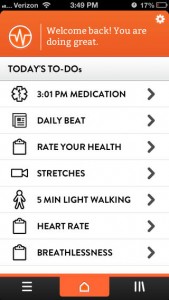 Wellframe, a Boston-based patient engagement and care management technology company, has raised $1.5 million in seed funding from a bevy of high profile investors and entrepreneurs, such as athenahealth CEO Jonathan Bush. Other investors in the round include Tim Draper, founder and managing director of Draper Fisher Jurvetson; Sir Sabaratnam Arulkumaran, president of the British Medical Association; Russ Nash, former global managing director at Accenture; Carl Byers, a venture partner at Fidelity Biosciences; and James Nahirny, founder and managing partner at Leerink Capital Partners.
Wellframe, a Boston-based patient engagement and care management technology company, has raised $1.5 million in seed funding from a bevy of high profile investors and entrepreneurs, such as athenahealth CEO Jonathan Bush. Other investors in the round include Tim Draper, founder and managing director of Draper Fisher Jurvetson; Sir Sabaratnam Arulkumaran, president of the British Medical Association; Russ Nash, former global managing director at Accenture; Carl Byers, a venture partner at Fidelity Biosciences; and James Nahirny, founder and managing partner at Leerink Capital Partners.
"We raised a million and a half from angel investors, many of whom have been C-Level execs at successful companies," CEO Jacob Sattelmair told MobiHealthNews. "We're looking to bring on proven operators that can provide guidance and networking as well as just capital. We place a premium on that."
Wellframe's platform combines a patient-facing engagement app, which includes educational components, exercises, and tracking features, with a clinician-facing dashboard for data access and HIPAA-compliant two way messaging.
"Our focus has really been on using mobile devices and artificial intelligence as a way of extending therapeutic relationships," Sattelmair said. "To help patients feel cared for on a day-to-day basis outside of the hospital."
Sattelmair said the company intends to use the funding to expand its team, which currently sits at just eight full-time employees. A larger, institutional round of funding is planned for next year.
The startup graduated from Rock Health's fourth class in 2012 and made news in February when it transitioned a one-year pilot with South Shore Hospital into a two-year contract, making South Shore its first customer. Now, Sattelmair said, the company has a number of customers among payors and providers, some of which will be announced in the near future.
As well as the cardiac rehabilitation pilot Wellframe did at South Shore, the company has done two more pilots: one pilot for COPD patients at a hospital in New York and one pilot for mental health patients at Boston's McClean Hospital. Sattelmair said data from some of those pilots is due to be published soon. The company is also working on translating their patient app into Spanish, in order to better address patient needs in the healthcare system.
"The data is very clear that the things the patients do day-to-day explain a lot of the variance in their recovery," Sattelmair said. "In a healthcare system that's increasingly focused on value, I don't think it's possible to do that in a robust way without knowing what patients are doing at home"















